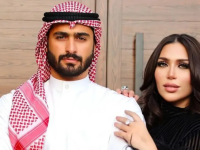For the first time, Johnnie Walker’s “Keep Walking Lebanon” campaign lent its voice to Lebanese millennials to celebrate their country’s progress and showcase how their generation can use art to move it forward.
Fourteen artistic projects created by university students and selected by judges were displayed in the campaign’s Keep Walking Lebanon Expo Feb. 7-9 at KED, in Beirut’s Karantina. Keep Walking Lebanon has been a prominent campaign in the country since 2004, and has celebrated the resilience of the Lebanese people. Johnnie Walker as a brand has aimed to champion progress and provide hope for a better tomorrow. Its mantra symbolizes progress against all odds, celebrating some of Lebanon’s greatest minds and achievements.
To this end, the whiskey company’s previous campaigns have featured prominent Lebanese “heroes” at the top of their fields, including award-winning director Nadine Labaki, whose 2018 film “Capernaum” has been nominated for an Academy Award, and renowned Lebanese architect Bernard Khoury.
This year’s campaign was launched in October, when the hashtag #KeepWalkingLebanon called for submissions from university students working individually or in a group to creatively interpret the Keep Walking Lebanon mantra.
The 14 final projects featured at the expo were selected from 200 submissions by university students from different artistic disciplines - including film, graphic design, architecture, interior design and fashion. Their ideas ranged from innovative product designs and installations to projections.
The winning submissions were then transformed into projects under the mentorship of industry experts such as Khoury, Beirut-based couture house Azzi & Osta, designer Nada Debs, film director Wissam Smayra and chief creative officer at Leo Burnett Beirut Bechara Mouzannar.
A large number of special guests attended the launch night on Feb. 7 to see the reveal of the final projects and meet the students who created them.
The final projects tackled topics ranging from Lebanese unity and women’s empowerment to the piling of garbage in the country and self-sustainable community designs. Each project shared an unwavering hope that the younger generation of Lebanon could build a better future.
“I was very pleased to be part of this initiative, because I really believe in this generation of millennial university students, and I work with ... millennials every day at the agency, so in my daily work this is where the fresh ideas are but the voice hasn’t been given to them yet,” said Mouzannar, who helped select the final projects and mentored some of the students.
Mouzannar said that the university students who worked on the projects believed in remaining in Lebanon and working in the country to create a change.
At the heart of the Expo was a strong sentiment that university students of Lebanon need to be given the right opportunities and platforms to express themselves and to create change. “If we don’t stay here, if we don’t create, if we don’t move forward, if we don’t stay in this country, this country is going to stay the same. It’s going to stay where it is,” 20-year-old Yasmine Saad said.
Saad joined the competition together with Lama Salame - both are third-year interior architecture students at the Lebanese Academy of Fine Arts (ALBA). The duo created an immersive installation wherein the attendees of the Expo walked through a suspended room built on-site that they said “tells the story of the Lebanese people.”
Both Lama Salame and Yasmine Saad expressed hope that the project reminds Lebanese people to forget the negatives of their past in order to move forward.
Another interactive installation required viewers to step on a platform attached to a wall in order to electronically collapse the wall. On the other side was another wall with a platform for viewers to stand on. When four people stood on each platform the walls would collapse and meet to create a bridge. When the walls came together, the words painted on them read, “We are weak when divided. When united we are strong.”
Viewers were left looking at each other and were then able to cross the newly created bridge to meet.
This was 21-year-old Carole El Danaf’s installation which stands as a confirmation on the impact of communal work to bridge religious, cultural and social divides.
Twenty-five-year-old Patrick Hajj, chose to produce and direct a short movie about the Lebanese folk dabke dance called “Mish Bas Folklore” (“Beyond Folklore”). The short film, as described by Patrick, portrays dabke as a symbol of unity and progress rather than just a wedding or special events feature.
Through his project, Hajj is calling for the unity of the Lebanese people. “I tried to focus more on the dabke showing that we as Lebanese people have passed through many struggles and that this dabke is kind of like a unity in order for us to move forward and build our country,” he said.
Hajj, who is an interior design major and recent graduate of Notre Dame University in Beirut, said he took a risk in making this project.
“It has changed my whole life, maybe even with the way I think. As an interior designer I did a short movie which was a new challenge for me,” said Hajj, who is thinking of pursuing directing full time.
All students involved in the final 14 projects will have the opportunity to intern with a judge relevant to the project’s field.
This article has been adapted from its original source.








